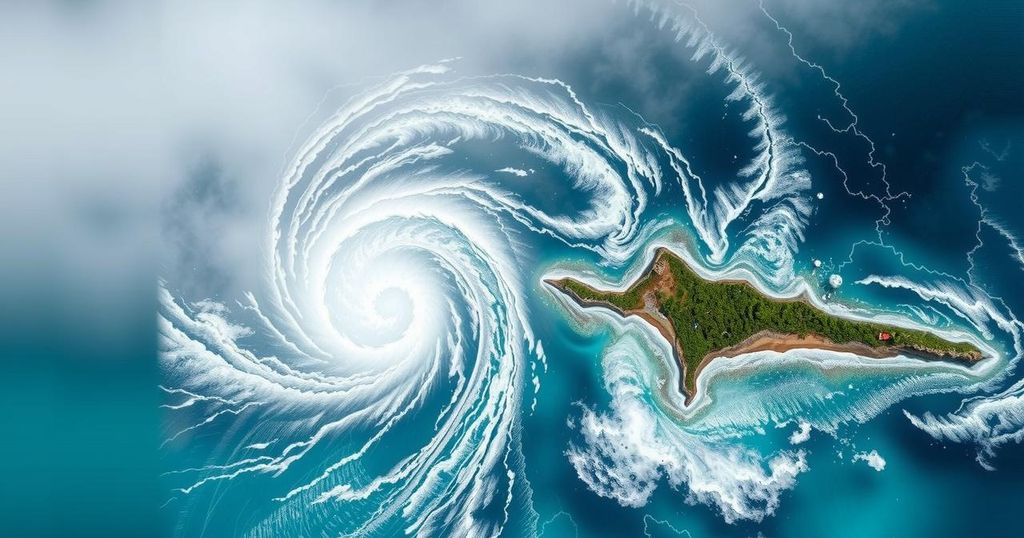Mayotte Endures New Tropical Storm Dikeledi Following Cyclone Chido’s Destruction
Mayotte is facing a new tropical storm, Dikeledi, just weeks after Cyclone Chido caused extensive damage and loss of life. Authorities have activated a red alert and advised residents to seek safety as flooding and landslides are imminent. Emergency personnel are deployed to assist in recovery and shelter preparations, while the islands’ challenges are intensified by their economic status and ongoing hardships following the previous cyclone.
The French territory of Mayotte is facing severe challenges as it has been struck by a new tropical storm, Dikeledi, merely weeks after suffering from Cyclone Chido, which wreaked havoc across the islands, claiming at least 39 lives and leaving hundreds missing. Authorities have advised the local population to remain indoors or seek sturdy shelter, as Dikeledi threatens to exacerbate the already dire situation with heavy rainfall and strong winds. Emergency response teams have been mobilized to deal with the aftermath of Chido and to prepare for potential flooding and landslides caused by the new storm.
Dikeledi, which weakened from a cyclone before arriving at Mayotte, was anticipated to pose significant risks, and a red alert was activated on Saturday evening. The Mayotte Prefecture issued warnings about the danger this storm could bring, including flooding and additional landslides. As a precaution, cyclone shelters were re-established at schools and community centers across the territory, underscoring the urgency and seriousness of the situation. The island’s infrastructure has already been heavily compromised following Cyclone Chido, particularly the international airport, which remained closed.
The area, already among the poorest in the European Union, has seen increased national and international attention following the destruction caused by Chido. Mayotte residents expressed dissatisfaction with governmental support during recent visits by French officials, particularly President Emmanuel Macron, leading to heightened scrutiny of France’s commitment to the islands. Over 4,000 emergency responders have been deployed to assist in both recovery efforts and respond to Dikeledi’s potential impacts. Reports indicate that even previously unaffected areas, such as the village of Mbouini, have suffered devastating floods, compelling residents to evacuate by boat as their homes were submerged.
As the tropical storm nears, the pressing needs of Mayotte’s approximately 320,000 residents, along with an estimated 100,000 undocumented migrants, are brought to the forefront. Both local authorities and international observers are diligently monitoring the unfolding situation, particularly given the recent historical context of destructive weather events in the region, including the catastrophic impact of Cyclone Idai in 2019, which had lasting ramifications across several nations.
Mayotte is a French-controlled archipelago located in the Indian Ocean off the coast of Africa, known for its strategic significance and demographic diversity, including a significant population of undocumented migrants. The islands have recently endured devastating natural disasters, particularly Cyclone Chido, which struck in mid-December 2023. This cyclone has been noted as one of the worst to impact the islands in nearly a century, leading to tragic loss of life, widespread destruction, and significant challenges in post-cyclone recovery efforts. The current cyclone season, spanning from November to April, has heightened the risks associated with tropical storms in this region, compelling local and national authorities to enhance their disaster preparedness measures.
In summary, Mayotte is grappling with the aftereffects of Cyclone Chido, which has led to tragic loss and an ongoing humanitarian crisis, just as another storm, Dikeledi, threatens to exacerbate these challenges. The French government has mobilized significant resources to address the immediate needs of the population, emphasizing the urgency of the situation due to severe weather impacts and the established emergency protocols. The international community will likely continue to observe the developments closely, given the historical context of natural disasters in this vulnerable region.
Original Source: www.wral.com




Post Comment